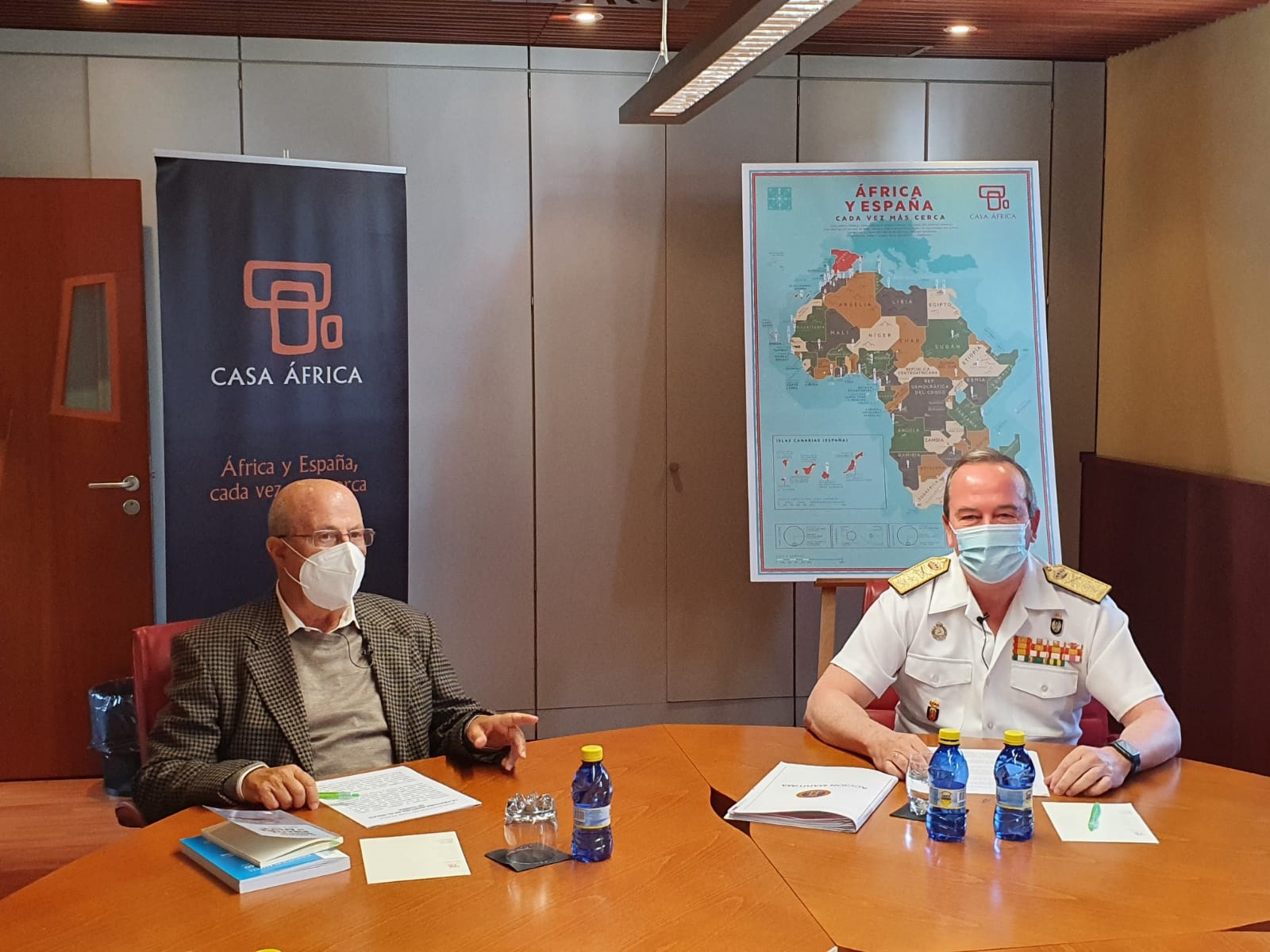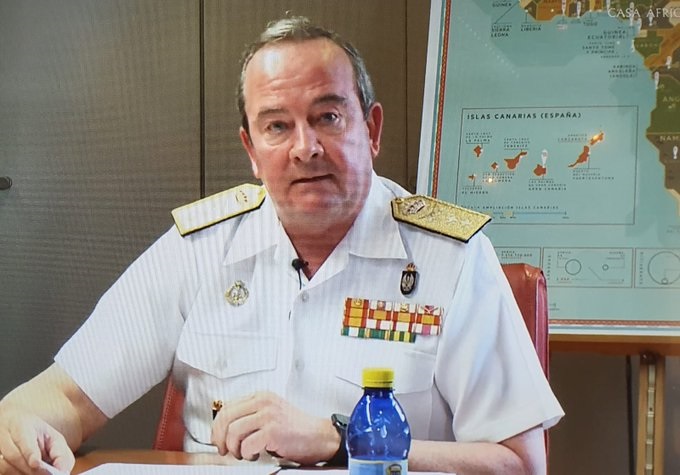
Focus on Africa Seminar: "The Gulf of Guinea has a strategic interest that makes it necessary to intensify the attention on this maritime space"
- Vice admiral Juan L. Sobrino, Commander of the Maritime Operational Command, speaks at the conference ‘Maritime Security in the Gulf of Guinea’ part of a series of lectures ‘Focus on Africa’ hosted by Casa Africa
Commander of Maritime Operational Command (CMOM), vice admiral Juan L. Sobrino, took part today in the series of lectures 'Focus on Africa', hosted by Casa África, to spread how the Armed Forces carry out, on the West African coast and the Gulf of Guinea, the operation called "African Deployment", currently conducted by vessel 'Furor'.
"It is not a zone of operations, but an area of cooperation" is the concept under which the MOM conducts the operation, as Vice admiral Sobrino explained. "In this sense, the current approach to the region is considered appropriate, completely respectful of the sovereign countries in the area, and it is based on bilateral relations and aimed at encouraging the coastal countries to assume responsibilities in their spaces of maritime sovereignty and influence, and respond to the security challenges in those spaces ”, he added.
As stated by CMOM, the activity of the Spanish Armed Forces in the Gulf of Guinea, “combines the concurrence of international initiatives with bilateral agreements with the coastal states in matters of maritime security; such as the cooperation with European initiatives ("Coordinated Maritime Presences" in the Gulf of Guinea) or multilateral ones, led by the US and France, with which Spain shares interests and objectives.
Thus, the African deployment is developed along three operational outlines. First, operational activities of Maritime Surveillance and Security in the field of standing operations within the operational structure of the Armed Forces, conducted by the Maritime Operational Command subordinated to the Commander of the Operations Command. “In addition, education and training activities are carried out both within the scope of the Cooperative Security agreements, with Cape Verde, Mauritania and Senegal, as well as bilaterally with the rest of the coastal countries. And, in a third line, support for diplomacy, meetings with key personnel, activities to support the defence industry, among others, are included” the Vice admiral listed.
Additionally, Navy units also carried out other Maritime Security activities, in cooperation with the navies of the coastal countries, to achieve an adequate knowledge of the maritime environment of the area, such as: surveillance of maritime communication lines, focused operations in certain areas of interest, patrols combined along with the regional navies and tactical training in the scope of the OBANGAME EXPRESS and NEMO exercises.
Coordinated Maritime Presences
“The strategic interest of the Gulf of Guinea for the EU and, in particular, for Spain, in combination with the increase in piracy actions, including the kidnapping of crew members, has forced the EU to intensify its attention on this maritime area of interest”, stated the CMOM.
For that reason, in June 2020 the Council of the EU adopted the conclusions on Security and Defence announcing the pilot case for Coordinated Maritime Presences in the Gulf of Guinea, in order to increase European Union’s capacity in the field of Maritime Security in areas considered of strategic interest.
“The Coordinated Maritime Presence mechanism aims to increase the EU's capacity as a trusted partner guaranteeing maritime security, in order to provide greater European operational intervention, ensure a permanent maritime presence and availability and promote maritime international cooperation”, the Vice admiral pointed out. The launch of the pilot case in the Gulf of Guinea reinforces EU's activity in the region, in line with EU’s strategy on the Gulf of Guinea, and in that is why the vessel 'Furor' is collaborating. "It supports the efforts of the coastal states and Yaoundé architecture organizations to address growing security challenges such as armed piracy and kidnapping for ransom".
“Maintaining a ship deployed in West Africa is not an easy task. Especially nowadays, in which the health evolution of COVID-19 in the coastal countries, makes the deployment be subject to the guarantees of sustainability of the ship, conditioned by the reduction of the mobility of personnel both in national territory, as well as in the countries with which it is planned to collaborate”, he added.
'Focus on Africa'
Casa Africa has organized four thematic online seminars on West Africa and the Sahel by experts and other stakeholders. The objective of these meetings is twofold. On the one hand, to increase in Spain the existing knowledge on various aspects around security in the region, which is significant for our country; and, on the other hand, to generate a space in which to give voice to both Spanish and African experts and, consequently, to generate contact and knowledge networks among them.
80% of world trade is carried out via maritime transport, according to the United Nations Conference on Trade and Development. Hence, pirate attacks represent a serious geostrategic threat. An example of this is its effect on the economy: in the Gulf of Guinea alone, the cost was USD 818.1 million, as ruled by the United Nations Office on Drugs and Crime.
The number of ships hijacked for this reason peaked in 2010, and as of 2019, the numbers did not continue to decline. But, the harsh economic impact caused by COVID-19 have led to a 24% increase in attacks. During 2020, according to the report published by the International Maritime Bureau (IMB), 195 attacks were registered worldwide, of which it is estimated that 90% of crew hijacking incidents occurred in the waters of the Gulf of Guinea.
Fotos



